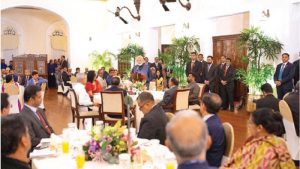Prime Minister Narendra Modi’s visit to Sri Lanka, (April 4-6), his first after 2019, demonstrated, beyond optics, the close ties between the two countries. Colombo, under the Janatha Vimukthi Peramuna (JVP)-led National People’s Power (NPP) regime, is serious about improving relations with New Delhi.
This was evident from the conferment of its highest honour for foreign leaders on PM Modi and a Memorandum of Understanding (MoU) on defence cooperation, billed as the first of its kind in bilateral ties. The JVP’s ascension to power, following Anura Kumara Dissanayake’s victory in the Presidential poll in September 2024, and the NPP’s resounding Parliamentary Election victory two months later, gave room to the perception that there would be a strictly formal, if not cold, relationship with India, given the JVP’s anti-India posture of the past.
Security concerns
There was also apprehension that Colombo might not be sensitive to New Delhi’s security concerns. However, to be fair to him, President Dissanayake reiterated his country’s long-standing position that Sri Lanka would not permit its territory to be used against India’s security and regional stability. Premier Modi captured the rationale behind the MoU by saying that “the security of both countries is interconnected and co-dependent”.

A State Banquet was hosted on April 5 at the President’s House in honour of Indian Prime Minister Modi.
Even though the MoU may have formalised certain arrangements in the area of defence, bilaterally, it is up to the NPP regime to establish that Sri Lanka means business in defence cooperation.
But still, Sri Lanka is sure to be conscious that an understanding in 1987 not to let Trincomalee or any other Sri Lankan port be used for military purposes by a third country against India has not helped dispel India’s concerns.
Detailed discussions
On the vexatious fishermen’s issue — one of importance to Tamil Nadu — it was a good sign that there were detailed discussions. But Premier Modi’s visit should trigger a full-fledged discussion between the fishing communities of the two countries, and one that is overseen by Government officials.
Recently, fishers on either side of the Palk Bay met and exchanged their views. If this meeting is to have some meaning, it should be followed up with another round of talks.
A flexible approach will help create a lasting solution. Another significant outcome of the visit is that Tamil political parties in Sri Lanka, in their meeting with Premier Modi, conveyed the point that they recognised the significance of the Indo-Lanka Accord of 1987 in pursuit of achieving a political settlement for the Tamils and sought India’s “legitimate involvement”.
There has been criticism even in Sri Lanka that many of the parties had not fully supported the Accord, which paved the way for the setting up of Provincial Councils (PCs) as a measure of devolution. New Delhi, which can provide liberal economic aid for the war-torn Northern and Eastern Provinces, should play the role of a dispassionate observer and urge every stakeholder to pursue democratic means to arrive at a consensus.
– Editorial,
The Hindu of April 8, 2025









